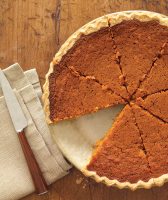More about "how long can brie sit out recipes"
HOW LONG CAN BRIE SIT OUT? - POKPOKSOM
Dec 28, 2021 · How Long Can Brie Sit Out? Due to the very soft texture of the brie, we recommend you store the brie in the refrigerator. The brie cheese will maximum stay good outside for 2 to 4 hours. If you want to eat it in its fresh form, you can keep it outside for above mentioned period. Refrigerated brie may turn a little hard.
From pokpoksom.com
From pokpoksom.com
See details
HOW LONG CAN BRIE SIT OUT - WELCOME TO VIETTINADS.COM
How Long Can Brie Sit Out? Answer: Cheese can typically sit out at room temperature anywhere from 4 to 8 hours, depending on the type, and remain safe to eat. Soft cheeses like Brie and Camembert, can sit out at room temperature for up to 4 hours , according to the food safety specialists at Clemson University’s Cooperative Extension.
From viettinads.com
From viettinads.com
See details
BRIE SHELF LIFE - WHEN DOES BRIE GO BAD
After opening, try to consume your brie within a week or two. It’s imperative to allow your cheese to breathe to preserve the best quality and taste. Wrapping the cheese in plastic wrap suffocates the live cultures and accelerates spoilage. Instead, store brie cheese wrapped in cheese paper or parchment paper.
From tipsbulletin.com
From tipsbulletin.com
See details
HOW TO EAT BRIE JUST LIKE THE FRENCH DO - PRÉSIDENT®
Feb 20, 2018 · When planning to serve Brie, take it out of the refrigerator about an hour before eating. This will allow the cheese to come to room temperature, and it will be irresistibly creamy. Set the wheel or wedge on a tray with a knife and your accompaniments of choice.
From presidentcheese.com
From presidentcheese.com
See details
CAN BRIE BE LEFT UNREFRIGERATED? - ASKINGLOT.COM
Jun 05, 2020 · Answer: Cheese can typically sit out at room temperature anywhere from 4 to 8 hours, depending on the type, and remain safe to eat. Soft cheeses like Brie and Camembert, can sit out at room temperature for up to 4 hours, according to the food safety specialists at Clemson University's Cooperative Extension.
From askinglot.com
From askinglot.com
See details
CRANBERRY BAKED BRIE - AHEAD OF THYME
From aheadofthyme.com
See details
HOW LONG CAN CHEESE SIT OUT BEFORE YOU DIE? | BON APPÉTIT
Apr 27, 2018 · To keep yourself safe from bacterial growth or spoilage, you should only keep cheese out for four hours, according to Adam Brock, director of food safety, quality, and regulatory compliance at ...
From bonappetit.com
From bonappetit.com
See details
THIS IS HOW LONG EVERY KIND OF FOOD CAN SIT OUT BEFORE IT ...
If it’s a hot day, then food should only be left out for an hour. When you freeze your food at a temperature of 0°F, the bacteria becomes inactive. At a proper fridge temperature of 40°F, bacteria does not grow or grows very slowly. Therefore, products will eventually go bad, but can stay fresher for longer.
From spoonuniversity.com
From spoonuniversity.com
See details
HOW LONG CAN BRIE SIT OUT? - POKPOKSOM
Dec 28, 2021 · How Long Can Brie Sit Out? Due to the very soft texture of the brie, we recommend you store the brie in the refrigerator. The brie cheese will maximum stay good outside for 2 to 4 hours. If you want to eat it in its fresh form, you can keep it outside for above mentioned period. Refrigerated brie may turn a little hard.
From pokpoksom.com
From pokpoksom.com
See details
BRIE SHELF LIFE - WHEN DOES BRIE GO BAD
If you’re bringing it to a potluck or dinner party, you might be asking, “How long can brie sit out?” Harmful bacteria and mold develop quickly at temperatures between 40-140?. Avoid leaving perishables like cheese at room temperature longer than two hours for optimal food safety.
From tipsbulletin.com
From tipsbulletin.com
See details
HOW LONG CAN BRIE SIT OUT - WELCOME TO VIETTINADS.COM
How Long Can Brie Sit Out? Answer: Cheese can typically sit out at room temperature anywhere from 4 to 8 hours, depending on the type, and remain safe to eat. Soft cheeses like Brie and Camembert, can sit out at room temperature for up to 4 hours , according to the food safety specialists at Clemson University’s Cooperative Extension.
From viettinads.com
From viettinads.com
See details
CAN BRIE CHEESE BE LEFT AT ROOM TEMPERATURE?
Jan 21, 2020 · Answer: Cheese can typically sit out at room temperature anywhere from 4 to 8 hours, depending on the type, and remain safe to eat. Soft cheeses like Brie and Camembert, can sit out at room temperature for up to 4 hours, according to the food safety specialists at Clemson University's Cooperative Extension.
From findanyanswer.com
From findanyanswer.com
See details
SMOKED BRIE RECIPE | FOOD NETWORK KITCHEN | FOOD NETWORK
Wrap the cheesecloth tightly around the cheese and tie closed with kitchen twine. Set the cheese, herb-side up, in the disposable pie pan. Once the grill reaches 250 degrees F, place the pan with ...
From foodnetwork.com
From foodnetwork.com
See details
HOW LONG CAN YOU LEAVE OUT REFRIGERATED FOODS? | SOUTHERN ...
Dec 27, 2021 · "Two hours is the maximum amount of time a cold food can sit out before it becomes dangerous, regardless of its ingredients. And at an outside event on a warm day, it's likely less time than that." To combat any bacteria, and frankly, any distasteful food, Lasyone first says to invest in a meat thermometer.
From southernliving.com
From southernliving.com
See details
BRIE CHEESE RECIPE | CHEESE MAKER RECIPE | CHEESE MAKING
The following recipe will produce two nice rounds of Brie. This recipe can be cut in half for two small cheeses using two M7 Camembert Cheese Molds or one M110 Brie Cheese Mold. The guideline below is for a good quality pasteurized milk. If using fresh raw milk, use about 30-40% less culture and about 25-30% less rennet.
From cheesemaking.com
From cheesemaking.com
See details
HOW LONG CAN CREAM CHEESE BE OUT OF THE FRIDGE? | MYRECIPES
Feb 13, 2018 · In general, hard cheeses like cheddar or Parmesan have a longer shelf life than soft cheeses like Brie or Camembert, but as far as soft cheeses go, cream cheese is relatively hardy. According to experts at the Dairy Council of Michigan, the shelf life of cream cheese can be as long as two weeks. The best way to extend the shelf life of your ...
From myrecipes.com
From myrecipes.com
See details
DOES ALL CHEESE NEED TO BE REFRIGERATED?
Jul 17, 2019 · As a general rule, hard cheeses such as cheddar, processed cheeses (American), and both block and grated Parmesan do not require refrigeration for safety, but they will last longer if kept refrigerated. (1) Hard cheeses (block): 6 months, unopened packages; 3 to 4 weeks after opening. Shredded hard cheeses: 1 month after opening.
From ask.usda.gov
From ask.usda.gov
See details
THE BEST CHARCUTERIE BOARD - DINNER AT THE ZOO
Sep 30, 2020 · How long can a charcuterie board sit out? You should plan to leave your grazing board out at room temperature for no more than 2 hours. If it’s a particularly hot day you’ll want to shorten this time frame to 90 minutes. If the board sits out for longer than two hours, you run the risk of spoilage. Leftovers can be refrigerated for later ...
From dinneratthezoo.com
From dinneratthezoo.com
See details
HOW LONG SHOULD YOU BRINE THANKSGIVING TURKEY? | MENTAL FLOSS
Nov 19, 2021 · According to Butterball, a good rule of thumb is to brine for an hour per pound of turkey. So, if you’re planning a big meal with a 14-pound bird, you’ll need a full 14 hours to brine it ...
From mentalfloss.com
From mentalfloss.com
See details
7 FOODS THAT CAN SURVIVE OUTSIDE THE FRIDGE - THESTREET
Oct 06, 2011 · According to the U.S. Department of Agriculture, soft cheeses should be discarded if they spend more than two hours over 40 degrees Fahrenheit. By contrast, hard cheeses (which also include ...
From thestreet.com
From thestreet.com
See details
HOW LONG CAN CHEESE BE OUT OF THE FRIDGE?
Sep 14, 2017 · But soft cheeses like Brie or Camembert will both taste stronger and be easier to spread if given a chance to come to room temperature, and firmer cheeses will be easier to cut.
From yahoo.com
From yahoo.com
See details
CAN YOU LEAVE BUTTER OUT? - STATEFOODSAFETY
There is still a debate as to how long butter can sit on the counter before going bad. For best quality, keep butter in a covered dish and use it within 10 days. You can also refrigerate or freeze butter to extend its shelf life. To sum up, you don’t need to panic if your cookie recipe calls for butter at room temperature.
From statefoodsafety.com
From statefoodsafety.com
See details
























